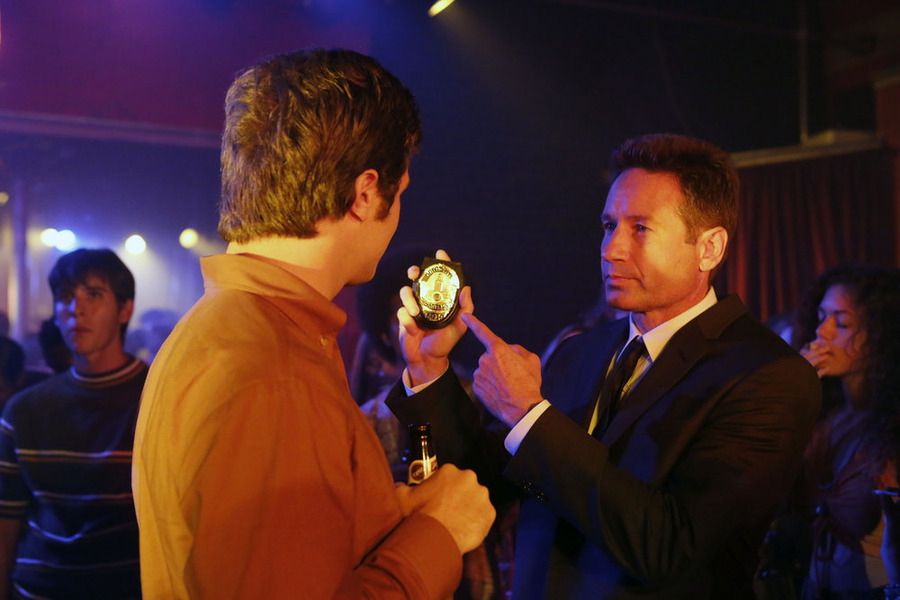
Serial killer, meet serial viewers.
Wednesday, NBC announced that it will make the entire 13-episode season of Aquarius, starring David Duchovny as a police detective on the trail of Charles Manson, available for streaming on May 28 immediately after its premiere on what we apparently now call “linear television.”
It’s the kind of news that’s both not so big and yet huge. On the one hand, Aquarius is a summer series, premiering just after the end of May sweeps, so the network is taking a relatively small chance in exchange for more attention than the show might otherwise have gotten.
On the other hand, that the network feels the need to test this at all shows that, not unlike an L.A. flatfoot in the Summer of Love, the world is changing whether it likes it or not. Binge-ers wanna binge, and if networks don’t give them that option, someday someone else will.
The announcement was especially striking after some recent news about Netflix. (When isn’t Netflix making news these days?) After its first-quarter earnings report, CEO Reed Hastings made the point of stressing the company’s big aim: not to replace companies like HBO, but eventually to replace the network system of TV generally. In Netflix’s view of the future, cable bundles will be replaced by baskets of Internet services (like itself) and streaming will supersede turning on a channel and watching what’s on.
The media covering Netflix (me included) have tended to cover it as a competitor to cable. It’s natural: like HBO, say, it’s a subscription service, not dependent on advertising, investing in original programming on top of its library of acquisitions so that people will feel they need to have it.
But there’s one thing that doesn’t match up in that analogy. Cable channels tend to have what you call “brands”–types of content or aesthetic philosophies that distinguish them from other channels. They may be literal: History channel is history, Comedy Central does comedy. They may be more amorphous: Bravo does aspirational lifestyle programming, FX does middle-aged male angst, HBO and AMC do the TV equivalent of movies or literature. (Not every show a channel makes will fit a brand, and brands can drift: USA, e.g., is moving from cheery “blue skies” programming to darker drama.)
Look at Netflix’s programming and its recent announcements, though, and try to tell me what Netflix’s brand is. It made House of Cards, a drama about a villain roughly, if superficially, in the HBO mold. But it also made Bloodline, a Damages-style potboiler, and Orange Is the New Black, a Showtime-esque drama/comedy from the creator of Weeds. It revived Arrested Development–but it’s also going to revive Full House. It dropped millions on Marco Polo, a lavish international historical production, and picked up Unbreakable Kimmy Schmidt, a castoff comedy from NBC. It made Daredevil, a superhero drama one notch darker and smaller-bore than the superhero dramas on broadcast TV. It’s adapting Green Eggs and Ham—as a series. (I guess you can devote an entire episode to “eating them on a train”?)
Look at those titles, and the other series in the pipeline, and tell me if you can discern a common thread, an ethos, an aesthetic. I can’t–except for this. The shows that Netflix creates and makes available to stream tend to carry DNA–subject or cast members or creators–from other, past TV series that its voluminous viewer data tells it that people are streaming. (Netflix, given the cost and difficulty of licensing movies, is mainly a TV-watching service now, though it’s also getting into the movie-making business.)
In other words, Netflix doesn’t have a brand, except: things that people have proven they like to stream on Netflix.
In TV, in this niche-targeted, specialized era, who has a brand of “Lotsa different kinds of stuff that different kinds of people like”? Not any cable channels–broadcast networks. NBC, ABC, CBS. That whole vast-tent approach was supposed to be fading in the cable-TV era.
Except that the way Netflix views the streaming business is as the most capacious virtual tent ever. In its view, there is a future for a TV-maker that is simultaneously broad and niche: selling a service to all kind of people and demographics, but appealing to them with very specific programs. It sees itself as a broadcaster of narrowcasting.
In a strange way, this vision would use a radically different way of structuring and watching TV to recreate one of the oldest paradigms in TV: something for everyone! Netflix sees itself as the next NBC or CBS, but for an era where everyone in the family looks at their own screen instead of gathering around a single hearth.
In different ways, in other words, NBC and Netflix seem agreed that eventually they will be in the same business. But Netflix is getting to NBC’s territory a lot faster than NBC is getting to Netflix’s.
More Must-Reads from TIME
- Cybersecurity Experts Are Sounding the Alarm on DOGE
- Meet the 2025 Women of the Year
- The Harsh Truth About Disability Inclusion
- Why Do More Young Adults Have Cancer?
- Colman Domingo Leads With Radical Love
- How to Get Better at Doing Things Alone
- Michelle Zauner Stares Down the Darkness
Contact us at letters@time.com